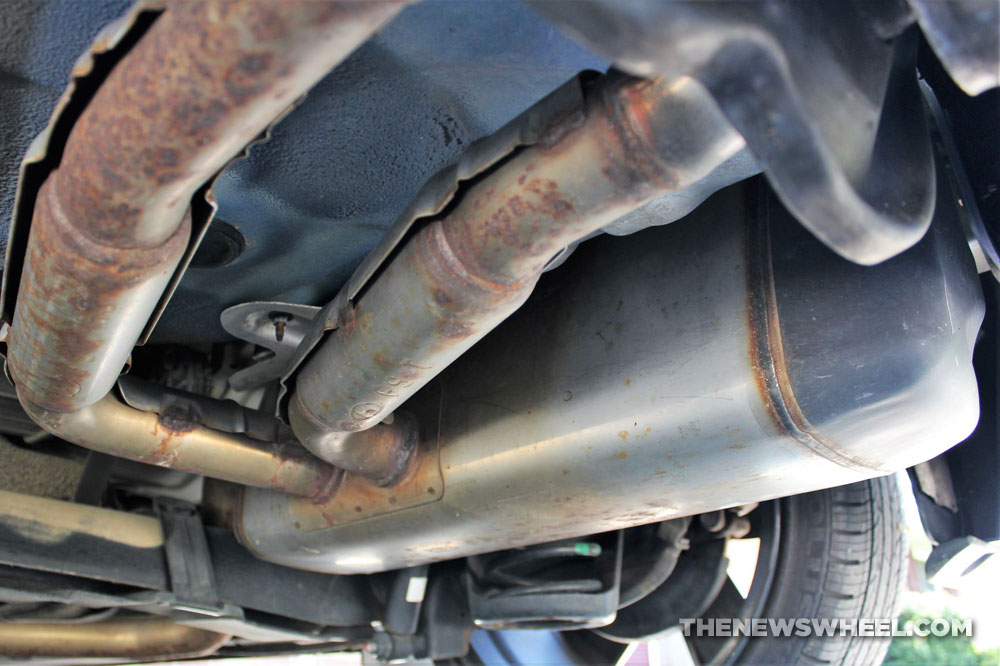 Photo: The News Wheel
Photo: The News Wheel
How do you know when your vehicle needs its exhaust system replaced? This pipeline that routes combustion toxins away from the engine and cabin is an important but often neglected vehicle component. Over time, it can rust, deteriorate, endure damage, get clogged, and separate from the mounting hardware. Here are the signs you should look for to determine when your vehicle needs its exhaust system fixed.
Aftermarket Exhausts: What are the differences between stock and performance exhausts?
- Loud or unusual noises: Damage to the pipes or muffler can result in loud roaring, knocking, humming, popping, or hissing — especially when you accelerate.
- Vibrations: Loosened exhaust mounts or a clogged catalytic converter can cause the system to shudder when exhaust fumes are expelled, which sounds like loud banging.
- Chemical smells: If you smell pungent odors of smoke, rotten eggs, gasoline, or burning chemicals inside or around the vehicle, there could be an exhaust leak.
- Sagging, scraping parts: The tailpipe can come loose from rusted mounting and start hitting the pavement on speed bumps or potholes.
- Change in performance: Do you notice that your vehicle is burning more fuel or is struggling to accelerate? A faulty exhaust system can affect engine performance and MPGs.
- Misfiring engine: If the vehicle doesn’t roar to life like it used to when you hit the ignition, the exhaust system could be hindering the combustion process.
- Check engine light: The exhaust system (including the oxygen sensors and catalytic converter) is one of the many powertrain elements that will trip this indicator warning light.
Repair the exhaust system when…
A simple patch or repair is enough when the exhaust system has small, isolated damage such as a picture in the pipe or a hole in the muffler. Component swaps are cheaper than full system replacements, so these targeted fixes can save you money if your budget is tight. A mechanic can patch a leak, tighten loose connections, and reweld mounts as needed.
Replace the exhaust system when…
When the majority of the exhaust system has deteriorated from age and rust, it’s better to have the entire line replaced. Select fixes won’t resolve a system-wide failure — especially one that’s causing toxic fumes to leak out. Saving money isn’t worth compromising your safety over, so pay for an exhaust overhaul if the system is failing.
- Protects you from harmful gasses: The combustion process creates toxic fumes such as carbon monoxide and nitrogen oxides, which are dangerous to inhale. The exhaust system eliminates these by converting them to innocuous gasses.
- Minimizes pollutants: These dangerous chemicals can also harm the environment. The catalytic converter minimizes their impact on the atmosphere.
- Better vehicle performance: A functioning exhaust system can conserve gasoline to improve fuel economy while facilitating stronger engine power.
- Reduces engine noise: A car with a broken muffler or exhaust pipe is LOUD! A functioning system results in quieter vehicle operation.
- Reduced engine/vehicle temperatures: Expelling fumes keeps hot gases away from the motor and cabin.
Aaron is unashamed to be a native Clevelander and the proud driver of a Hyundai Veloster Turbo (which recently replaced his 1995 Saturn SC-2). He gleefully utilizes his background in theater, literature, and communication to dramatically recite his own articles to nearby youth. Mr. Widmar happily resides in Dayton, Ohio with his magnificent wife, Vicki, but is often on the road with her exploring new destinations. Aaron has high aspirations for his writing career but often gets distracted pondering the profound nature of the human condition and forgets what he was writing… See more articles by Aaron.


